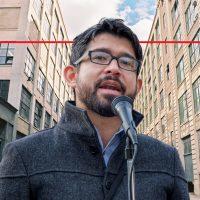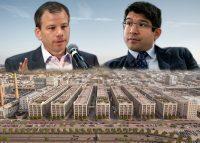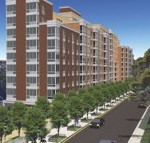The City Council has until early November to vote on the proposed rezoning of Industry City, but support from some members could hinge on Mayor Bill de Blasio’s getting involved at the last minute.
So far, he has been missing in action, members lamented Tuesday.
During a hearing, Council members repeatedly asked why the de Blasio administration has not been involved with the private application to rezone the 35-acre Brooklyn campus.
Council member Carlos Menchaca, whose Sunset Park district includes the business campus, called on the development team — a partnership between Jamestown, Belvedere Capital, Cammeby’s International and Angelo, Gordon & Co. — to secure investment from the city. That, along with a vocational high school, was among the 10 requirements the council member identified as necessary to win his support for the rezoning.
Menchaca also demanded a community benefit agreement with a local coalition to guarantee that jobs created at the campus would go to area residents.
Last month, Menchaca disrupted the proposal’s path to approval by announcing that he would vote against it. Originally, in September 2019, Menchaca said the application could move forward only if the development team made certain concessions, including a legally binding benefits agreement.
When Menchaca asked Industry City CEO Andrew Kimball about the status of the development team’s discussions with a community coalition, Kimball declined to go into detail. The CEO also acknowledged that the school depends on the city’s Department of Education getting involved.
“This is the nature and the breaking point of this entire application,” Menchaca said. “The mayor’s not here. You don’t know when that’s going to happen.”
Council member Antonio Reynoso echoed this discomfort, saying that it is easy to be open to building a school but without an engaged administration, promises to deliver one are empty.
“I could commit to build a 2,000-acre park in Williamsburg — pending administration approval,” he said. “You could welcome everything, all the bells and whistles.”
Reynoso also said it was “naive” to believe that the development team’s projection that the rezoning will generate 20,000 jobs has not been affected by the pandemic.
When asked about Industry City at a separate press conference, the mayor deferred to the City Council and noted that the rezoning is being pursued through a private application.
“I think the important thing is to let the City Council do its deliberations for now,” he said. “And then if at some point I think it’s important to weigh in, I will.”
Roughly 200 people signed up to testify at the morning hearing, which continued well into Tuesday afternoon. The hearing, held by the City Council’s zoning subcommittee, followed the nearly unanimous approval of Industry City’s rezoning application by the City Planning Commission in mid-August. The commission almost invariably reflects the view of the mayor.
The development team is seeking to rezone the 35-acre waterfront campus to allow for more retail, academic space and offices. During the hearing, Kimball highlighted that the development team has made concessions, agreeing to nix dormitories that were originally planned for the project, as well as hotels and conference space. If the rezoning is rejected, the development team will need to pursue other options, he said.
“The alternative as-of-right strategy will create far fewer jobs and forfeit the dynamic academic collaborations we propose,” Kimball said, reading prepared testimony. “It will also force us to look more closely at the highest-return opportunities available in [manufacturing] zones today, namely pure office and last-mile warehouse distribution.”
Opponents have been unimpressed by Kimball’s promises of jobs, believing that the positions will not be available to most Sunset Park residents and would attract newcomers who would push longtime residents out of their housing.
Kimball pushed back, saying “there is no evidence linking the creation of jobs at Industry City to gentrification in the neighborhood.”
Read more



Kimball said the development team is willing to put off adding retail and new buildings “until we have demonstrated that jobs are going to local residents.” Under a benefits agreement, he said, the development team would also preserve manufacturing space.
Menchaca and Kimball briefly sparred over the evolution of the application, with the elected official criticizing the development team for moving forward with its proposal last October. Kimball emphasized that discussions have been ongoing since 2013 and the process has repeatedly been delayed.
Though the local member’s support for a land-use application is typically essential for securing approval, Council members Ritchie Torres, Donovan Richards and Robert Cornegy Jr. have urged their colleagues to defy that custom. At Tuesday’s hearing, Cornegy again voiced his support for the proposal. Some of the city’s most influential labor unions — 32BJ SEIU and the Building and Construction Trades Council of Greater New York — have also thrown their support behind it.
During Tuesday’s hearing, Menchaca said a rezoning isn’t needed to attract jobs to Industry City, calling the proposal a “threat” to thousands of working-class immigrant families in the area. He said the development team moved forward with its land-use application before a community coalition — formed as part of a required framework he laid out — was able to hire an attorney. Menchaca said the team refused to advance the rezoning discussions “on the community’s terms.”
“Promises by major developers are broken every day,” he said, adding that the proposal hasn’t reached “the level of accountability my community demands and deserves.”
